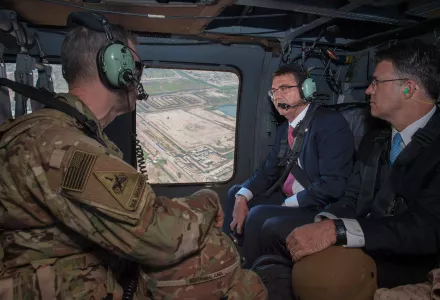
Ash Carter Discusses the Campaign to Destroy ISIS
“A ruthless enemy spreading like cancer across the Middle East—and inspiring terror around the world. Regional allies and rebel forces too weak, too disorganized, or too timid to fight back. A Washington campaign lacking strategic clarity or urgency.”
“These were just some of the daunting challenges America faced against ISIS when I became Secretary of Defense in 2015,” writes Belfer Center director Ash Carter in his new report, A Lasting Defeat: The Campaign to Destroy ISIS. “By that point, remnants of Al Qaeda in Iraq had coalesced under Abu Bakr al-Baghdadi to become as merciless as they were ambitious, brutally slaughtering innocents as they proclaimed a new caliphate that would stretch from Morocco and Spain to China and Sri Lanka.”
“Today,” Carter says, “Iraqi and coalition soldiers—backed by an American force the finest the world has ever known—have routed ISIS in two of its most important former strongholds: Raqqa and Mosul. How America, together with her friends and allies, turned the tide against a common enemy is a story of good fortune, critical leadership decisions, and skill and bravery on the part of young men and women in uniform.”
In his recent Center report, Ash Carter outlines several key lessons from this campaign:
Good strategy depends on honest assessment.
The massive reorganization in the planning, execution, and communication about the counter-ISIS campaign was set in motion only after I uncovered the true state of existing efforts. This assessment included some painful conclusions about our chain of command and the lack of accurate intelligence about the enemy. Unifying our fight against ISIS under a single (exceptionally qualified) commander made a major difference.
“Lines of effort” are no substitute for strategy. Washington has developed a bad habit of stuffing bullet points under an alliterative title and calling it a strategy. ISIS was not going to be defeated by lines of effort. It would take concrete steps organized into a real battle plan—and it would begin by winning the approval of the president, local partners, and an international coalition.
Metrics are motivating.
Even at the highest levels of government, officials often gravitate toward talking points and aspirations. Against a barbaric enemy like ISIS, what mattered most was results. So when we met with our coalition partners, we insisted on measuring their critical contributions in a chart that held everyone accountable. Meetings traditionally known as gab fest became enormously productive.
Personal relationships are essential. At the core of every tie between allies is a bond between friends. When making big asks, enlisting resources, or partnering on the battlefield, history and national interests are not enough. Getting Kurdish and Iraqi forces to set aside their long-standing animosity in the name of defeating ISIS was not easy. Neither was asking European partners to increase their role. But each came about because of hard-earned trust and the personal bonds of shared pain and shared purpose.
No timetables.
The pressure to project and then report military milestones publicly is immense. But organizing a campaign around artificial deadlines isn’t just unrealistic—it is also counter-productive. In our case, moving prematurely, before local fighters had been properly trained and equipped, would have given ISIS the advantage. There are no do-overs in war. So we did it once, and we did it right.
Victory must be built to last. Could American forces have marched into Raqqa and Mosul in short order? Yes. Would that have accomplished our objective? No. Dealing ISIS a lasting defeat required a different battle plan—one that put local forces in the lead. This naturally took longer to execute, but through patient, persistent progress, we are defeating ISIS in a way that creates conditions for long-term security.
Read the full report here.
"Crafting 'A Lasting Defeat,'" Belfer Center Newsletter, Belfer Center for Science and International Affairs (Fall/Winter 2017-2018).


